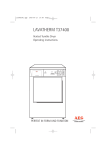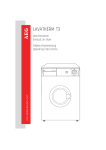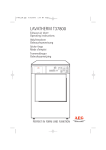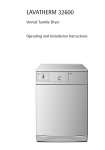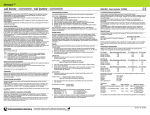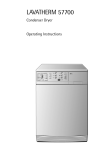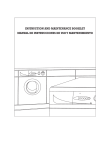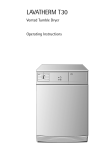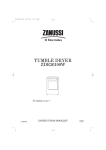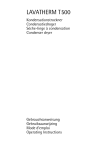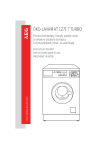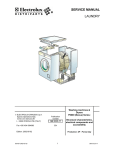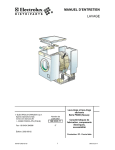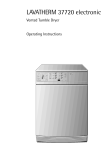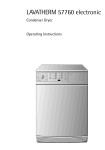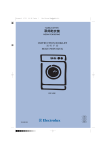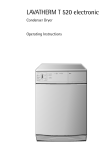Download Electrolux T37400 Clothes Dryer User Manual
Transcript
125980461_1.qxp 2004-10-12 15:14 Page 1 LAVATHERM T37400 Vented Tumble Dryer Operating instructions T 37400 TIMED PROG. RESET COOLING ON OFF DRYING DRY FRESH COOLING 90 MIN END LOW NO TEMP. BUZZER START ANTICREASING PHASE READY TO WEAR STORE DRY SLIGHTLY DAMP IRON DRY 60 MIN 30 MIN BABY DRY WRING DRY COTTON IRON DRY SYNTHETIC EXTRA DRY STORE DRY EXTRA DRY PERFEKT IN FORM UND FUNKTION 125980461_1.qxp 2004-10-11 11:31 Page 2 Dear customer, Please read these operating instructions carefully and pay particular attention to the safety notes indicated in the first pages. We recommend that you keep this instruction booklet for future reference and pass it on to any future owners. The warning triangle and/or the key words (Warning!, Caution!) emphasize information that is particularly important for your safety or correct functioning of the appliance. This symbol guides you, step by step, in the operation of the appliance. The information marked with this symbol provides additional instructions and practical tips on the use of the appliance. Tips and information about economical and ecological use of the machine are marked with the clover symbol. Should any problems arise, this booklet provides instructions on how to solve them by yourself; see section “Something not working?”. If this information is not sufficient, please contact our nearest Service centre (address and telephone numbers are indicated on the enclosed leaflet). Printed on recycled paper. People who think ecologically, act accordingly.... 2 125980461_1.qxp 2004-10-11 11:31 Page 3 Contents Safety instructions . . . . . . . . . . . . . . . . . . . . . . . . . . . . . . . . . . . . . . . . . . . . . 5-6 General instructions . . . . . . . . . . . . . . . . . . . . . . . . . . . . . . . . . . . . . . . . . . . . . . 7 Discarding . . . . . . . . . . . . . . . . . . . . . . . . . . . . . . . . . . . . . . . . . . . . . . . . . . . . . . . 8 Tips for environmental protection . . . . . . . . . . . . . . . . . . . . . . . . . . . . . . . . . . 9 Structure of the appliance . . . . . . . . . . . . . . . . . . . . . . . . . . . . . . . . . . . . . . . 11 Front view. . . . . . . . . . . . . . . . . . . . . . . . . . . . . . . . . . . . . . . . . . . . . . . . . . . . . . . 11 Rear view . . . . . . . . . . . . . . . . . . . . . . . . . . . . . . . . . . . . . . . . . . . . . . . . . . . . . . . 11 Control panel . . . . . . . . . . . . . . . . . . . . . . . . . . . . . . . . . . . . . . . . . . . . . . . . . 12-13 Before the first drying cycle. . . . . . . . . . . . . . . . . . . . . . . . . . . . . . . . . . . . . . 14 Brief operating instructions . . . . . . . . . . . . . . . . . . . . . . . . . . . . . . . . . . . . . . 14 Drying. . . . . . . . . . . . . . . . . . . . . . . . . . . . . . . . . . . . . . . . . . . . . . . . . . . . . . . . . . 15 Sort out the laundry . . . . . . . . . . . . . . . . . . . . . . . . . . . . . . . . . . . . . . . . . . . . . . 15 Open the door . . . . . . . . . . . . . . . . . . . . . . . . . . . . . . . . . . . . . . . . . . . . . . . . . . . 15 Load the laundry . . . . . . . . . . . . . . . . . . . . . . . . . . . . . . . . . . . . . . . . . . . . . . . . . 15 Switch the machine on. . . . . . . . . . . . . . . . . . . . . . . . . . . . . . . . . . . . . . . . . . . . 16 Select the drying programme/time . . . . . . . . . . . . . . . . . . . . . . . . . . . . . . . . . . 16 Select the required options . . . . . . . . . . . . . . . . . . . . . . . . . . . . . . . . . . . . . . . . 16 Start the machine . . . . . . . . . . . . . . . . . . . . . . . . . . . . . . . . . . . . . . . . . . . . . . . . 16 Remove or add laundry . . . . . . . . . . . . . . . . . . . . . . . . . . . . . . . . . . . . . . . . . . . 17 End of drying cycle . . . . . . . . . . . . . . . . . . . . . . . . . . . . . . . . . . . . . . . . . . . . . . . 17 Anti-creasing phase . . . . . . . . . . . . . . . . . . . . . . . . . . . . . . . . . . . . . . . . . . . . . . 17 Switch the tumble dryer off . . . . . . . . . . . . . . . . . . . . . . . . . . . . . . . . . . . . . . . 17 Clean the filters . . . . . . . . . . . . . . . . . . . . . . . . . . . . . . . . . . . . . . . . . . . . . . . . . . 17 Programme charts . . . . . . . . . . . . . . . . . . . . . . . . . . . . . . . . . . . . . . . . . . . . . . . 18 Automatic drying (electronic programmes) . . . . . . . . . . . . . . . . . . . . . . . . . . . 18 Time controlled drying . . . . . . . . . . . . . . . . . . . . . . . . . . . . . . . . . . . . . . . . . . . . 18 Brief summary of fabric information . . . . . . . . . . . . . . . . . . . . . . . . . . . . . . 19 Care symbols . . . . . . . . . . . . . . . . . . . . . . . . . . . . . . . . . . . . . . . . . . . . . . . . . . . . 19 Cleaning and care . . . . . . . . . . . . . . . . . . . . . . . . . . . . . . . . . . . . . . . . . . . . . . . 20 External cleaning. . . . . . . . . . . . . . . . . . . . . . . . . . . . . . . . . . . . . . . . . . . . . . . . . 20 Cleaning the door . . . . . . . . . . . . . . . . . . . . . . . . . . . . . . . . . . . . . . . . . . . . . . . . 20 Cleaning the filters . . . . . . . . . . . . . . . . . . . . . . . . . . . . . . . . . . . . . . . . . . . . . . . 20 Cleaning the drum . . . . . . . . . . . . . . . . . . . . . . . . . . . . . . . . . . . . . . . . . . . . . . . 21 Cleaning the panel and the controls. . . . . . . . . . . . . . . . . . . . . . . . . . . . . . . . . 21 Something not working? . . . . . . . . . . . . . . . . . . . . . . . . . . . . . . . . . . . . . . . . . 22 3 125980461_1.qxp 2004-10-11 11:31 Page 4 Technical specifications . . . . . . . . . . . . . . . . . . . . . . . . . . . . . . . . . . . . . . . . . . 23 Electrical connection . . . . . . . . . . . . . . . . . . . . . . . . . . . . . . . . . . . . . . . . . . . . 23 Permanent connection . . . . . . . . . . . . . . . . . . . . . . . . . . . . . . . . . . . . . . . . . . . . 24 Unpacking . . . . . . . . . . . . . . . . . . . . . . . . . . . . . . . . . . . . . . . . . . . . . . . . . . . . . . 25 Door reversal . . . . . . . . . . . . . . . . . . . . . . . . . . . . . . . . . . . . . . . . . . . . . . . . . . . 25 Special accessory . . . . . . . . . . . . . . . . . . . . . . . . . . . . . . . . . . . . . . . . . . . . . . . . 25 Kit washing/drying column . . . . . . . . . . . . . . . . . . . . . . . . . . . . . . . . . . . . . . . . 25 Service . . . . . . . . . . . . . . . . . . . . . . . . . . . . . . . . . . . . . . . . . . . . . . . . . . . . . . . . . 26 4 125980461_1.qxp 2004-10-11 11:31 Page 5 Safety instructions Safety instructions It is most important that this instruction book should be retained with the appliance for future reference. Should the appliance be sold or transferred to another owner, or should you move house and leave the appliance, always ensure that the book is supplied with the appliance in order that the new owner can get to know the functioning of the appliance and the relevant warnings. The safety of AEG appliances complies with the industry standards and with legal requirements on the safety of appliances. However, as manufacturers, we feel it is our duty to provide the following safety notes. You MUST read them carefully before installing or using the appliance. General safety • Under no circumstances should you attempt to repair the machine yourself. Repairs carried out by inexperienced persons may cause injury or serious malfunctioning. Contact your local Service Force Centre or your AEG dealer. . Always insist on genuine AEG spare parts. • Before starting the appliance check that the rated voltage and the type of current indicated on the rating plate correspond to those which exist where the dryer is installed. The type of fuse is also indicated on the rating plate. • Never start the appliance if the electrical supply cable is damaged or the control panel or worktop are so damaged that inner components can be reached. • Unplug the appliance before carrying out any cleaning or maintenance operations. • Never pull the power supply cable to remove the plug from the socket; always take hold of the plug itself. • Do not lean on the open door, the appliance could turn over. • Never spray the machine with a jet of water. Danger of electric shock! • If the drying programme is interrupted in order to remove the laundry: the laundry and the drum could be very hot. 5 125980461_1.qxp 2004-10-11 11:31 Page 6 Safety instructions Child safety • Children are often not aware of how dangerous electrical appliances can be. When the machine is working, they should be carefully supervised and not be allowed to play with the appliance - there is a risk that they could become trapped inside. • The packaging components (e.g. plastic film, polystyrene) can be dangerous to children - danger of suffocation! Keep them out of children’s reach. • Make sure that children or pets do not climb into the drum. Positioning and connection • Follow the separate instructions for positioning and connection. • Check that the appliance has not been damaged during transport. Never connect a damaged appliance! If this is the case, contact your dealer. • The dryer must not be installed in a room where the temperature can fall below zero or is higher than + 35°C. • The dryer must be levelled. • The dryer must not be positioned on a thick pile carpet as this would prevent air from circulating freely through the ventilation slots. • If the appliance is installed near a gas, coal or electric heater, an insulating non-inflammable panel must be inserted between the dryer and the heater (size: 85x57.5 cm). • The plug of the dryer must always be accessible. • The dryer’s exhaust must not be fed into a cooker hood, or a chimney or flue pipe designed to carry the exhaust from a fuel burning appliance. • Ensure the room is well ventilated. • A permanent connection to the mains power supply can only be carried out by a qualified electrician. 6 125980461_1.qxp 2004-10-11 11:31 Page 7 Proper use • For safety reasons, the appliance must not be modified. • This appliance is designed for domestic use only. If the dryer is used for any other purposes or is not used correctly, the manufacturer accepts no responsibility for any possible damage that might occur. • Dry only items that have been washed with water. Never dry items that have been in contact with inflammable solvents (petrol, methylated spirits, dry cleaning fluid and the like). These are of a volatile nature and could cause an explosion or a fire. • Items containing rubber foam or materials similar to rubber foam must not be dried in the appliance. Fire danger! General instructions • Starched fabrics leave traces of starch in the drum, therefore they should not be dried in the appliance. • If the load to be dried exceeds the maximum weight indicated, creasing may occur. For particularly delicate fabrics, the maximum load should not exceed 1.5 kg. • For your information: 70 per cent of fabric wear is caused by wearing the garments, 20 percent by washing and only 10 percent by drying them in a tumble dryer. In your appliance, fluff accumulates in the filter. Only 0.03g fluff per Kilo will be lost by your laundry when being machine dried. 7 125980461_1.qxp 2004-10-11 11:31 Page 8 Discarding Packaging materials Dispose of your tumble dryer’s packaging materials correctly. All materials are environmentally friendly and can be disposed of without any danger. The plastic parts can be reused: • The external plastic cover and the bags inside are made of polyethylene (>PE<). • The padding is made of CFC free polystyrene foam (>PS<=). Cartons are made of recycled paper and should be disposed of in paper collection containers. Appliance Warning! When the appliance is disposed of, pull the plug out of the socket, cut off the electrical supply cable and destroy the plug with the remaining cable. Disable the door catch in order to prevent children from becoming trapped inside while playing. Use an authorised disposal site for your old appliance. 8 125980461_1.qxp 2004-10-11 11:31 Page 9 Tips for environmental protection • During washing, try not to use fabric softeners! If the laundry is machine dried, it will remain soft even without using fabric softeners. • Shake out your laundry! Shake out the laundry before putting it into the dryer in order to reduce the drying time and creasing. • Spin the laundry properly before drying it! As a general rule, the more the laundry is spun, the more economically your dryer works. In the following table, indications on consumption are provided, according to the spin speed. The data refers to 6 kg of laundry that have to be store dried. Spinning: Revolutions per minute Drying cycle: Residual dampness in litres in % Time required in minutes Energy requirement in kWh 800 4.2 70 107 4.0 1000 3.9 65 100 3.6 1200 3.6 60 94 3.36 1400 3.3 55 82 3.0 •Please observe the full load specifications! The machine works more economically if it is fully loaded, as indicated in the programme charts. 9 125980461_1.qxp 2004-10-11 11:31 Page 10 • Select the correct drying programme! Select the drying programme suited to the type and quantity of laundry, so that your dryer will work more economically. Some consumption values: Type of laundry Cotton1 Cotton 1 Mixed fabrics 2 Desired degree of dryness Load in kg Duration in minutes Energy consumption in kWh Store dry 6 107 4.0 Iron dry 6 100 3.6 Store dry 2.5 94 1.1 1) previously spun at 800 rpm 2) previously spun at 650 rpm. • SYNTHETIC: can only be used for loads up to 2,5 kg! • Clean the fluff filter after each drying cycle! 10 125980461_1.qxp 2004-10-11 11:31 Page 11 Structure of the appliance Structure of the appliance Front view Control panel T 37400 EXTRA TIMED PROG. G RESET END NO BUZZER ON OFF ANTI- G CREASIN PHASE DRY FRESH 90 MIN 60 MIN 30 MIN DRY BABY IRON DRY TIC DRY READY TO WEAR DRY STORE Y SLIGHTL DAMP DRY IRON DRY WRING N COTTO COOLIN DRYING G COOLIN START LOW PAUSE TEMP. EXTRA STORE DRY DRY SYNTHE Fluff filters Rating plate Door (opening direction can be changed) Adjustable feet Rear view Power supply cable Rear vent outlet Side vent outlet Ring nut Intake grille 11 125980461_1.qxp 2004-10-11 11:31 Page 12 Structure of the appliance Control panel 1 Programme chart/Selector dial This will help you to select the correct programme for drying: electronically or time controlled. Turn the dial to the required programme or time. 2 ON/OFF button This button is used to switch the dryer on. At the end of the pro gramme, release this button by pressing it again to switch the dryer off. 3 Mains-on light It comes on when the appliance is switched on (ON/OFF button pressed down) and goes out when this button is released. 4 Low temperature button Pressing this button allows drying to be performed at a lower temperature, for delicate items. The corresponding pilot light comes on. 5 Buzzer OFF button Press this button when selecting the programm if you wish to switch the buzzer off during the anticreasing phase. The corresponding pilot light comes on. 6 Start button Press this button for about 2 seconds to start the dryer after having selected the drying programme. If the door is opened while the programme is running, this button must be pressed again after closing the door in order to re-start the programme from the point at which it was interrupted. This button must also be pressed after a power cut. In both cases light DRYING or COOLING (depending on the phase in progress) flashes to remind you that the start button needs to be 12 125980461_1.qxp 2004-10-11 11:31 Page 13 Structure of the appliance pressed again. 7 LIGHTS DRYING -this light indicates that the machine is performing the drying phase. COOLING -this light indicates that the appliance is in the cooling phase. At the end of drying, there is a 10 minute cooling phase to cool the laundry. If light DRYING or COOLING is flashing, this means that the Start button needs to be pressed again for the programme to resume. END -this light flashes at the end of the cooling phase and during the anti-creasing phase. ANTI-CREASING PHASE -this light flashes alternately with the light END at the of the drying phase (after cooling) and during the anticreasing phase. If only light END flashes, his means that the anti-creasing phase has finished. 13 125980461_1.qxp 2004-10-11 11:31 Page 14 Before the first drying cycle Wipe the drum of the dryer with a damp cloth before performing the first drying cycle. Brief operating instructions • Spin the laundry as much as possible. • Sort out the laundry. • Put the laundry into the tumble dryer. • Switch the machine on. • Select the drying programme/time. • If necessary, press the HALF TEMP. and/or NO BUZZER button. • Press The Start button for about 2 seconds to start the dryer. When the programme is in progress, the door can be opened in order to remove laundry or to add other items. At the end of the programme: • Switch off the tumble dryer. • Remove the laundry. • End of drying cycle. • Anti-creasing phase. • Clean the fluff filters. 14 125980461_1.qxp 2004-10-11 11:31 Page 15 Drying Drying Sort out the laundry • To prevent bundling of laundry: close zips, button up pillow cases and duvet covers; tie any strings, such as apron strings. • Empty pockets. • Remove any metal parts (paper clips, safety pins, etc. ....). • Turn garments made of double layer fabrics inside out (e. g. turn anoraks with cotton lining inside out), so that they will dry better. • Shake out the laundry. Open the door • Open the door by presing on the left side as per picture . P1104 Load the laundry Warning! When closing the door, do not trap any garments! The fabrics could get damaged. Please check the laundry does not get caught between the door and filter. • Put the prepared and shaken out laundry into the dryer. ON OFF P1108a 15 125980461_1.qxp 2004-10-11 11:31 Page 16 Drying Switch the machine on • Press the ON/OFF button the mains-on light comes on. ON OFF nexxxt01 Select the drying programme/time • Turn the selector dial to the desired programme or time nexxt02 Select the required options • Depress NO BUZZER and/or LOW TEMP. button, if you have to dry particulary delicate items. LOW NO TEMP. BUZZER START nexxxt03 Start the machine • Depress START button for 2 seconds, the machine starts operating and the DRYING light comes on. 16 125980461_1.qxp 2004-10-11 11:31 Page 17 Drying To change a programme already in progress, turn the selector dial to RESET position, select the new programme and then depress START button. Important! If the drying programme has to be stopped before it reaches the end, we recommend that you turn the programme selector dial to position COOLING and wait until the end of this phase before removing the laundry. This will avoid a build-up of heat inside the appliance. Remove or add laundry It is possible to interrupt the drying cycle at any time in order to remove or add laundry. Open the door. Caution! Laundry and drum can be hot. Remove or add laundry. Close the door and press START button to continue the drying cycle. End of drying cycle A cooling phase is performed before the end of the drying cycle: the heat is cut off during this phase. After the cooling phase, it is possible to remove the laundry from the dryer. Immediately open the door and remove the laundry. Anti-creasing phase If you do not remove the laundry at the end of the programme, the machine will automatically carry out an Anti-crease phase for approx 30 mins. During this period the drum will rotate at regular intervals to avoid creasing and the buzzer will sound for 1 second every 10 seconds, unless you have depressed the NO BUZZER button. The lights END and ANTI-CREASING PHASE will flash alternatively. Switch the tumble dryer off Depress ON/OFF button. Pull out the plug. Clean the filters To ensure free circulation of air during the drying cycle, the fluff filters must be cleaned after each drying cycle, before removing the laundry. 17 125980461_1.qxp 2004-10-11 11:31 Page 18 Programme charts Automatic drying (electronic programmes) Type of laundry Cotton Synthetics Programme Max-load 6 6 6 (*) 6 6 (*) 6 2.5 2.5 (*) 2.5 1 EXTRA DRY READY TO WEAR STORE DRY SLIGHTLY DAMP IRON DRY WRING DRY EXTRA DRY STORE DRY IRON DRY Jumpers BABY DRY Jackets, trousers, dresses, skirts. DRY FRESH (1) 1 - 4 garments (*) According to CEI 1121 Standards. • Baby dry is a special programme for jumpers to be dried “ready to wear”. • Dry fresh is designed to clean and freshen garments labelled “dry clean only” and “hand wash” at home, in your tumble dryer, using the special product available on the market. Time controlled drying Type of laundry Cotton Cotton Synthetics Drying time 90 min 60 min 30 min Max-load (1) Programme selector dial position 6 6 2.5 90 MIN 60 MIN 30 MIN (1) Never overfill the drum (do not load large quilts, for example). Drying times vary according to: • The type of laundry • The degree of spinning prior to drying. • The size of the load • The degree of dryness required COOLING This position on the programme selector dial can be used to freshen the laundry (e.g. to remove a persistent odour of moth-balls). Load It is often difficult to estimate the weight of items to be dried. We therefore recommend that you adopt the following guidelines: • cotton, linen: drum full but not too tightly packed; • synthetics: drum no more than half full; • delicate fabrics: drum no more than one third full. 18 125980461_1.qxp 2004-10-11 11:31 Page 19 Brief summary of fabric information Care symbols Check whether fabrics are suitable for tumble drying. One of the following symbols should appear on the care label: Basically, this fabric can be tumble dried; however the manufacturer does not specify whether it can be dried with normal or low temperature. Normal drying (normal temperature) Gentle drying (low temperature) Do not tumble dry If none of these symbols is found: Dry cottons, as well as mixed fabrics, at normal temperature. Press the LOW TEMP. button when delicate cottons have to be dried. It is advisable to take into consideration the care symbols on garment labels when buying them. • Wool, eiderdowns Do not dry any woollen items in the tumble dryer! They can felt! Eiderdowns can be tumble dried only if the corresponding care symbol is present. • Fabrics sensitive to high temperatures Dry fabrics sensitive to high temperatures (such as acrylic or viscose) and items bearing the care symbol using a synthetic drying programmes. • Tricot garments, knitwear • Tricot garments and knitwear tend to shrink. Do not overdry these items. High quality products are less likely to shrink. • New coloured fabrics Do not dry new coloured fabrics with light-coloured laundry. This could lead to discoloration! 19 125980461_1.qxp 2004-10-11 11:31 Page 20 Cleaning and care Cleaning and care Warning! You must disconnect the appliance from the electricity supply, before you can carry out any cleaning or maintenance work. External cleaning Use only soap and water and then dry thoroughly. Important: do not use methylated spirit, diluents or similar products. Cleaning the door Clean periodically the interior part of the door to remove any fluff from the seals around the filter. Regular cleaning ensures correct drying. 650 800 / kg 5 kg 2,5 900 70' - 90' 35' - 50' 1000 / 1200 65' - 85' 30' - 45' 800 / 900 80' - 100' 70' 55' - 1000 / 1200 75' - 95' 50' - 65' kg 2,5 kg 1 50' - 60' 30' - 35' E R S V E R E T O A U P1109 Cleaning the filters Your dryer will only function well if the filters are clean. The filters collect all the fluff which accumulates during drying and they must therefore be cleaned at the end of each programme, before removing the laundry, with a damp cloth. 650 800 / kg 5 kg 2,5 P1110 20 900 70' - 90' 35' - 50' 1000 / 1200 65' - 85' 30' - 45' P1111 800 / 900 80' - 100' 70' 55' - 1000 / 1200 75' - 95' 50' - 65' kg 2,5 kg 1 50' - 60' 30' - 35' E R S V E R E T O A U 125980461_1.qxp 2004-10-11 11:31 Page 21 Cleaning and care The filter in the inner door must be removed for cleaning. Do not be alarmed by the amount of fluff. It is not due to excessive wear caused by the dryer. All fabric looses fluff when drying but it goes un-noticed in the air. In a tumble dryer it simply collects in the filter. If necessary the filters can be cleaned under running water using a brush. In this case, remove the filter in the door opening as per picture (it can be positioned with the tongue facing to the left or to the right). 650 800 / kg 5 kg 2,5 900 70' - 90' 35' - 50' 1000 / 1200 65' - 85' 30' - 45' 800 / 900 80' - 100' 70' 55' - 1000 / 1200 75' - 95' 50' - 65' kg 2,5 kg 1 50' - 60' 30' - 35' E R S V E R E T O A U P1112 Cleaning the drum Warning! Do not clean the stainless steel drum with abrasive detergent or steel wool. Wipe the inside of the drum and the drum paddles with a standard household detergent (e.g. vinegar solution). Cleaning the panel and the controls Warning! Do not use household furniture polish or abrasive detergents. Wipe the panel and the controls with a damp cloth only. Use only warm water. 21 125980461_1.qxp 2004-10-11 11:31 Page 22 Something not working? If a problem occurs, you can try to solve it yourself following the instructions below. If you call out an engineer when one of the following problems occurs, or to repair a fault due to incorrect use, the call-out will be charged even if requested within the guarantee period. Problem Possible cause The door has not been closed. The plug is not properly inserted in the power socket. The dryer does not work. There is no current at the socket. The main fuse or the fuse in the plug has blown. A drying programme or time has not been selected. The START button has not been depressed. The laundry has not been spun properly. The filters are clogged up. The room temperature is too high. Unsatisfactory drying results. The selected drying cycle was not suitable for the laundry. The LOW TEMP. button has been pressed. There is too much laundry inside the appliance. The dryer is not correctly installed. The drying cycle is too long. Clean the fluff filters. If you cannot find any useful information in these operating instructions to solve your problem, please contact our nearest service centre. 22 125980461_1.qxp 2004-10-11 11:31 Page 23 Technical specifications Height x Width x Depth 85x60x57 cm Depth with the door open 107 cm Height adjustment 6 mm Empty weight 32 kg approx. Load (according to the programme) max. 6 kg (Different load sizes in some countries are due to different measuring methods) Use Domestic Permissible ambient temperature +5°C to +35°C This appliance complies with the following EC directives: - 73/23/EEC of 19/2/1973 “Low voltage directive” - 89/336/EEC of 3/5/1989 “EMC directive” including modification directive 92/31/EEC. Electrical connection Specifications concerning the power supply are indicated on the rating plate. The rated voltage and the type of current stated on the plate must correspond to those which exist where the dryer is installed. Also refer to the rating plate for the type of fuse required. Permanent connection must be carried out only by a qualified engineer. Warning! THIS APPLIANCE MUST BE EARTHED. The manufacturer declines any liability should this safety measure not be observed. Before switching on, make sure the electricity supply voltage is the same as that indicated on the appliance’s rating plate. (See picture on page 11). The appliance is supplied with a 13amp plug fitted. In the event of having to change the fuse in the plug supplied, a 13amp ASTA approved (BS1363A) fuse must be used. Should the plug need to be replaced for any reason, proceed as described below. The wires in the mains lead are coloured in accordance with the following code: 23 125980461_1.qxp 2004-10-11 11:31 Page 24 Green and Yellow - Earth Blue - Neutral Brown - Live GREEN & YELLOW 13 A E N L BROWN BLUE P1041 CORD CLAMP The wire coloured green and yellow must be connected to the terminal marked with the letter «E» or by the earth symbol or coloured green and yellow. The wire coloured blue must be connected to the terminal «N» or coloured black. The wire coloured brown must be connected to the terminal marked «L» or coloured red. Upon completion there must be no cut, or stray strands of wire present and the cord clamp must be secure over the outer sheath. Warning! A cut off plug inserted into a 13 amp socket is a serious safety (shock) hazard. Ensure that the cut off plug is disposed of safely. Permanent connection In the case of permanent connection it is necessary that you install a double pole switch between the appliance and the electricity supply (mains), with a minimum gap of 3mm between the switch contacts and of a type suitable for the required load in compliance with the current electrical regulations. The switch must not break the yellow and green earth cable at any point. 24 125980461_1.qxp 2004-10-11 11:31 Page 25 Warning! Unpacking Slide out the polythene bag with the polystyrene stuffing before using the appliance. Pull off adhesive strips from inside machine on top of drum. P1106 Door reversal To make it easier to load or unload the laundry the door can be reversed. This operation must be carried out by qualified personnel. Please contact the nearest Service Force Centre. This is a chargeable option. Special accessory You can obtain the following special accessory through the AEG customer service organisation or from your dealer. Kit Washing/drying column With this kit you can combine your dryer with any LAVAMAT automatic washing machine to a washing and drying column. The appliances are stacked in space-economising manner in this arrangement, the washing machine at the bottom and the dryer at the top. P1107 25 125980461_1.qxp 2004-10-11 11:31 Page 26 Service In the chapter “Something not working?” some problems that can be solved by yourself are listed. Read this section in the event of problems. If you are not able to find a solution, contact the Service centre. It is close by and, if necessary, an engineer will soon be with you. (Addresses and telephone numbers are given on the enclosed form). In all cases, set your speech before calling, in order to facilitate troubleshooting: the engineer will be able to decide whether a service visit is necessary. Take note of the serial number (Ser. No.) and the product number (Prod. No.) indicated on the rating plate. Ser. No. . . . . . . . . . . . . . . . . . . . . . . . . Prod. No. . . . . . . . . . . . . . . . . . . . . . . IPX4 Mod. xxxxxx Type xxxxxxx Prod.No. xxxxxxxxx xx xxx-xxxV~xxHz xxxxW xx A Ser.No. Try to specify, as precisely as possible: • The symptoms of the fault. • When the fault occurs. When can a service visit be charged during the guarantee period? - when it should have been possible to solve the problem by yourself, with the help of the troubleshooting chart (see section “Something not working?”) - when the engineer has to come out several times because he has not been given all the relevant information he needs and so, for example, has to fetch spare parts. Repeated trips can be avoided if you prepare your call to the Service centre as described above. 26 125980461_1.qxp 2004-10-11 11:31 Page 27 27 125980461_1.qxp 2004-10-11 11:31 AEG Hausgeräte GmbH Postfach 1036 D-90327 Nürnberg http://www.aeg.hausgeraete.de © Copyright by AEG 125980461 Page 28




























